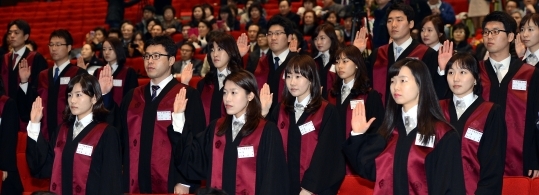Over 25% of the total prosecutors are women but no female chief prosecutor
Prosecutor Cho Heejin considered as a strong candidate as the nation’s first Chief Prosecutor of the District Prosecutors’ Office

More than ever before, there are high expectations for the appointment of a female prosecutor to a high-level position in the upcoming staff reshuffling. After the appointment of the first female Minister of Justice in 2003, the first female Supreme Court justice and the first Justice of the Constitutional Court were appointed, thereby creating a crack in the glass ceiling of the law enforcement authorities. Nevertheless, the glass ceiling still remains strongly fortified in the prosecution authority. According to the Glass Ceiling Index released by The Economist on March 8th marking International Women’s Day, Korea ranked 26th, the lowest among the OECD countries. And above any other field, the prosecution authority is known to have a particularly thick glass ceiling akin to a bullet-proof glass.
Currently, the Korean prosecution authority is faced with an unprecedented crisis following the resignation of top prosecutors including the former Prosecutor General Chae Dongwook who resigned from his post after being embroiled in an allegation that he had a son out of wedlock and Cho Younggon, the chief of the Seoul Central District Prosecutors' Office, from allegation that the government was involved in the investigations of the country’s intelligence agency in the presidential election. Against this backdrop, appointing female to important posts is considered the strongest reform measure at hand.
According to the Ministry of Justice, as of May 10th, the number of female prosecutors stands at 487 out of the total 1928, which translates to 25.3%. Last year, among 50 new prosecutors, more than half were women. To be exact, 32 newly appointed prosecutors were women, which shows that female prosecutors are no longer a minority group. In 1982, former lawmaker Cho Baesook and attorney Lim Sookkyung were in the spotlight as the first female prosecutors, but it took 8 years for the next female prosecutor to be appointed. So looking back, we have come a long way. However, can we truly say that we have accomplished much given the current circumstances?
The biggest problem is female prosecutors are excluded from high-level posts and important positions. This is represented by the staff reshuffling in April when prosecutor Cho Heejin at the Seoul High Prosecutors’ Office who was highly-anticipated to become the very first female Chief Prosecutor of the District Prosecutors’ Office failed to become promoted. Except for the appointment of Director Roh Jeongyeon of the Ministry of Justice to Seoul Central DPO, and professor Park Soyoung of the Judicial Research and Training Institute and prosecutor Hong Jonghee to the Ministry of Justice, no female prosecutors were appointed at the junior prosecutor level in any of the offices across the country.
In particular, there was no female prosecutor appointed to the Seoul Central District Prosecutors' Office, the most coveted office of all. Therefore, the current gender imbalance in the organization represented by the ratio of female to male stands at 1 to 10 will continue for some time. One junior prosecutor said that “I am disappointed and even feel hopeless to see that my role model who worked so hard did not get promoted.” She added that “Although more women are becoming prosecutors, there are only about 10 senior-level prosecutors. Also, it’s depressing that female prosecutors can hardly move to offices which look good on their resumes.”
During this promotion season, the most highly anticipated posts are the four major positions including the Chief Prosecutor of the Seoul Central DPO, chief of the Central Investigation Department (CID) of the Supreme Prosecutor’s Office, chief of Public Security Department of the Supreme Prosecutor’s Office, and the chief prosecutor at the Ministry of Justice, and the first chief prosecutor of Anti-Corruption. Since rankism is deep-rooted in the law enforcement authorities, the 16th and 17th graduates of the Judicial Research and Training Institute are most likely to be promoted this year. However, in the regular promotion season next February, some of the 19th and 20th graduates are expected to be appointed as Chief Prosecutors.
Against this backdrop, prosecutor Cho Heejin who has an impressive track record of being the first female in many positions is receiving attention once again. She served as the senior prosecutor twice at the Seoul Central District Prosecutors' Office, the first Women’s Affairs Officer at the Ministry of Justice, the first senior prosecutor at the Ministry of Justice, and the first female Chief of the Branch Prosecutors’ Office. With such a spectacular career path, prosecutor Cho is considered to be well-qualified as the Chief of the district prosecutor’s office.
On her campaign trail, President Park Geunhye promised to reform the prosecution authority by adopting rational and predictable Human Resource policies. The prosecution authority should no longer delay appointing female prosecutors to high-ranking positions in order to overcome this situation let alone the adverse effect of the predominantly male-centric culture.

